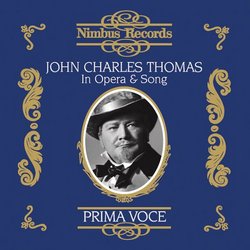| All Artists: Ruggero Leoncavallo, Giuseppe Verdi, Umberto Giordano, Gioachino Rossini, Tito Mattei, Stefano Donaudy, Jules Massenet, Ambroise Thomas, Henri Duparc, Emile Pessard, Augusta (Mary Anne) Holmes, Joseph Marx, Ludwig van Beethoven, Richard [Classical] Wagner, Geoffrey O'Hara, Frank Bridge, Percy Grainger, May H. Brahe, Frank Tours, Nathaniel Finston Title: John Charles Thomas in Opera & Song Members Wishing: 0 Total Copies: 0 Label: Nimbus Records Original Release Date: 1/1/2006 Re-Release Date: 8/8/2006 Album Type: Import Genres: Folk, Special Interest, Pop, Classical Styles: Vocal Pop, Opera & Classical Vocal, Historical Periods, Classical (c.1770-1830), Early Music, Modern, 20th, & 21st Century Number of Discs: 1 SwapaCD Credits: 1 UPC: 710357793127 |
Search - Ruggero Leoncavallo, Giuseppe Verdi, Umberto Giordano :: John Charles Thomas in Opera & Song
 | Ruggero Leoncavallo, Giuseppe Verdi, Umberto Giordano John Charles Thomas in Opera & Song Genres: Folk, Special Interest, Pop, Classical
"If I had to choose the four greatest voices I?ve heard, I would list Thomas along with Enrico Caruso, Rosa Ponselle, and Ezio Pinza." -FRANK CHAPMAN, OPERA NEWS During his forty-eight year career, music critics ranked Jo... more » |
Larger Image |
CD Details
Synopsis
Album Description
"If I had to choose the four greatest voices I?ve heard, I would list Thomas along with Enrico Caruso, Rosa Ponselle, and Ezio Pinza." -FRANK CHAPMAN, OPERA NEWS During his forty-eight year career, music critics ranked John Charles Thomas with Enrico Caruso, hailing him as one of the great voices of the twentieth century. One critic wrote, "I have seen a good many so-called enthralled audiences during my earthly career, I have seen them stand up and clap. I have heard them cheer. But I have never seen one just refuse to go home. That is ... until Mr. Thomas? concert". Thomas made his operatic debut in Washington as Amonasro in Aida, on the eve of President Coolidge?s inauguration in 1924. Over seventy-eight minutes of music on one CD! This is the operatic companion disc to John Charles Thomas: An American Classic. Born in Meyersdale, Pennsylvania in 1891, John Charles Thomas studied voice at the Peabody Conservatory in Baltimore. After a successful career in musical comedy, he made his operatic debut in Washington DC and later sang with the Royal Opera, Brussels. He made his Metropolitan Opera debut in 1934 in Verdi?s La traviata, joining the company in 1935. Well-known as a concert and radio singer, Thomas also appeared in motion pictures. He died in 1960. Despite his magnificent voice, critics were often unkind to Thomas because he advocated translating opera into English and sang a large number of light classics in his recitals, things that stereotyped him as a "bourgeois" artist.

 Track Listings (21) - Disc #1
Track Listings (21) - Disc #1